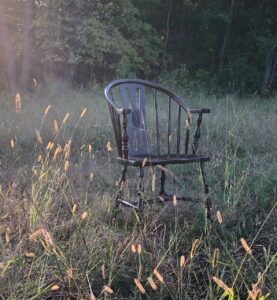Cane held firmly in his hand, Dad leans back into the simple wood chair, settling in for a visit. My in-laws include the visit on their scenic drive. Each time, Dad pauses on his careful walk up our walkway to slowly take in the open space and trees around our bungalow. Then he enters and settles into the solid chair. For many visits, the simple chair held him. But now it is empty. He no longer sits in the chair. He currently sits in a far better place with his Heavenly Father.
The Chair
We all have them in our homes—a favourite for reading or a practical one at the breakfast table. Whatever the size or shape, the chair is there to invite and welcome. It invites one to a meal. It welcomes a loved one inside the home to a conversation and a sense of belonging. It allows a friend to rest while we enjoy words and memories and sharing of lives. The chair’s invitations express our love.

In my heart, over time, this stable armchair had become “Dad’s Chair.” I hadn’t been aware that this wooden chair had now become an “empty chair” until another loved one sat in it one day. My heart pricked at seeing someone else sitting in it. It was another reminder that, along with the phone call that never happens and the absence of a smile, he would not sit in it again. These memories are only the beginning, aren’t they? Holding a loved one close to our hearts and giving them the sacred place of Dad, friend, or daughter ensures that the loss continues to ache over time. It doesn’t take a break, but it may soften.
But now consider other chairs you have in your life. Consider chairs that embrace dreams, longings, hopes, or even a sense of what is right and good. When those dreams are delayed or dashed, when minor disappointments build on top of each other to overflowing, when failures explode, or relationships break, these too are painful losses. The longing for a child is an achingly empty chair. The months, perhaps years, robbed by depression or anxiety, can’t ever be a chair filled again. The loss of a friendship, whether through geography or worldview, is painful. Entering a new, quickly approaching season of life means saying goodbye to the present—each an empty chair. Even the past few years in a virus-tilted world have littered lives with vacant chairs of various sizes and shapes. Grief and loss flow out of those empty seats.
The reality is that though these chairs in our lives ought NOT to be empty, they are. With all its heartwrenching pain and vague yet persistent undercurrents throughout our days, the empty chairs become woven into our story. So what do we “do” with these empty chairs? Even for those who follow Jesus, this has no simple answer. Each of us will have our unique story of walking through the time that follows our loss. We can’t compare the pages of our story to others around us. We must each walk our journey, and there is no way to get around it. However, can we shape our story so the aches heal, or at least begin to?
Perhaps a place to start is remembering we live in an eternal story. Our individual stories, woven into the larger Story, have an ending beyond this life. Our lives, embraced by an all-seeing, loving, heavenly Father who has always existed, promises to work good out of each loss. As we “call to remembrance” His kindness through past moments of loss, we can find comfort in knowing He will do the same in the days ahead. We see His grace as we allow ourselves the time it takes to know our Father within the rugged landscape of loss. And time is certainly needed. Over the seasons, we can grow in inviting Him into our moments. It takes a persistent seeking to find Him in His words on the pages of the Bible. As we grow to live in the story, we will bear lasting fruit.
Depending on what our empty chair looks like, we may need to permit ourselves to lament. Not just once but again and again. What if we invited the Father to sit in our vacant chair and, as a child, we crawl on His lap, pour out our hearts and welcome Him into our losses. How might He work? (You can find more reflection on what is called The Lament – in the Resources tab.)
Eyeing the empty chair in our family room, the Lord kindly reminded me of another chair. He brought to mind a glorious chair that represents the final authority and conclusion in my story. He beckoned me to consider this chair and what it tells me about Him and my empty chairs.
Thus says the LORD: “Heaven is my throne, and the earth is my footstool”…and behold, a throne stood in heaven, with one seated on the throne.
Isaiah 66:1 and Revelation 4:2
Let us make a small room on the roof…with a chair…
2 Kings 4:10
The Throne
In the town of Shunem, in Northern Israel, a wealthy woman provided Elisha, the travelling prophet, with a room that had a bed, table, lamp, and yes, a chair. Her provision began with meals for the prophet as he passed through her town. It turned into a place of staying and rest. Interesting that the author in the passage identifies a list of the furniture for meeting Elisha’s needs. On that list was a chair. The Hebrew word used for chair is kisse or kisseh. Translated, it means seat of honour, throne. How often aren’t the places of honour a chair? Either in our homes for our guests or our hearts for the precious thing we hold dear? This wealthy woman recognized the distinction due to this man of God and provided a fully furnished room for his needs – including a place to sit.
The disciple John saw a door open to Heaven. Through that doorway, he saw a chair, a seat of honour, a glorious throne that stood in Heaven. This chair is filled! Majestically filled! Seated on the throne is the Lord Almighty, whose appearance is one of “jasper and carnelian and around the throne was a rainbow…” (Rev. 4:3). The appearance of precious stones sounds wondrous and mysterious. Yet, in case we think that we cannot approach such a God, the Lord tells us in Isaiah 66, “Heaven is my throne, and the earth is my footstool…But this is the one to whom I will look: he who is humble and contrite in spirit…” What might happen when we approach this Throned One with our empty chairs, offering the brokenness in our hearts to Him? There is a place to lament our loss and pain, but can we also make a place in our hearts for worship? What might happen when we hold the lamentations in our hearts in tension with His gloriously filled throne?
Our lamentations remind us of things and people that are gone, of that which is fleeting. We have a King, though, that is seated on His throne. Revelation 4:2 uses the Greek word kathemai for seated, which suggests the meaning to dwell, reside. Related to this word kathemai, is the Greek word hedraios. Together these words hint at the idea steadfast. Our King fills His throne as One who steadfastly lives in it, with power and complete authority. He is not going anywhere!
I invite you to join me in placing your empty chair into the hands of the One who sits on the throne forever. He is the Ancient of Days, the King over all kings and rulers and the Victor over Death. He is our complete supply in the face of loss. He tenderly collects our tears when we cry. One day, ONE DAY, those of us who are in Christ will have our tears wiped away and say with every living creature in Heaven, “To him who sits on the throne and to the Lamb be blessing and honour and glory and might forever and ever!” (Rev. 5:13)
Pray this song with me?
(Click on the title for the song by Sovereign Grace Music)
Behold Our God
Who has held the oceans in His hands?
Who has numbered every grain of sand?
Kings and nations tremble at His voice
All creation rises to rejoice
Who has given counsel to the Lord?
Who can question any of His Words?
Who can teach the One who knows all things?
Who can fathom all His wondrous deeds?
Behold our God seated on His throne
Come let us adore Him
Behold our King nothing can compare
Come let us adore Him!
Who has felt the nails upon His hands
Bearing all the guilt of sinful man?
God eternal humbled to the grave
Jesus, Savior, risen now to reign.
God eternal humbled to the grave
Jesus, Savior, risen now to reign!
Behold our God seated on His throne
Come let us adore Him
Behold our King nothing can compare
Come let us adore Him!
Further Study
1. Read the story of the Shunammite woman in 2 Kings 4:8-37.
Her story is full of joy, sadness and unusual details. What might the Lord want to show you? What might He want to teach you about Himself? About you? What questions can you leave with Him, trusting He will guide you in time?
2. Slowly ready Revelation 4.
What do you notice about the throne room? What do you see? Hear? Feel?
What do you notice about the One on the throne? What do you see? Hear? Feel?
Have a conversation with your Father about what you have learned. Receive what He wants to share with you.


I love this! It made my heart ache with the losses often so close to the surface and swell with the joy that is always there and that overrides the pain because of the beautiful hope that is sure in our beloved Jesus! How incredible that we can belong to this enthroned God of the universe, glorious in splendour and majesty! That we are invited to crawl up in His lap and be comforted forevermore! Thank you for your insight, teaching and encouragement, Annetta!
Oh, He is so good. I, too, love the image of crawling on His lap, to talk to my Father. I am thankful you were encouraged.
A beautiful and tender expression of trust as I consider my chairs. Thanks, Annetta, for the invitation to crawl into my Father’s lap with my losses and my everything – on His throne. Quite amazing to be welcomed so, isn’t it?!
As I prepare to pack up and move from a home I’ve lived in for over 20 years; the one in which the accumulated precious things of the generation before me have been collected – including chairs – I find myself in the precarious position of realizing I’m the end of the line. The generations that follow are not necessarily interested in what those before them felt were worth saving. In the end, I’ve chosen to let the things go and will hold on the memories of those that valued them. Those loved ones now sit before the throne and the most precious One is what captivates their attention now.
Thank you Annetta for your thoughtful and insightful consideration of the fleeting “things” of life, pointing us to God’s word and the reminder of what is eternal that awaits those who have chosen to cling to the One who is everlasting.
I was reading your blog post still fighting the urge to allow anxiety, insecurity and the spirit of fear to win when I read: “The months, perhaps years, robbed by depression or anxiety, can’t ever be a chair filled again.” Wow! Just… wow! As I continue to read your eloquent words I am soothed knowing that solace truly is found through the “persistent seeking to find Him in His words on the pages of the Bible. As we grow to live in the story, we will bear lasting fruit.” I know one day I will break free of fear and self-critical thoughts but am grieved over the years lost. I’m also filled with joy that Our Father has been guiding me through this journey while navigating an ever perverse world, one where the darkness continues to be exposed and yet many do not see or hear it. And I’m so thankful for you and the gifts God has given you. The way you deliver your message leads the reader to His Message and The Truth- on many levels and I’m always in awe!!
Great content! Keep up the good work!